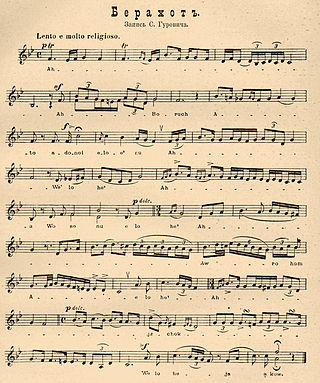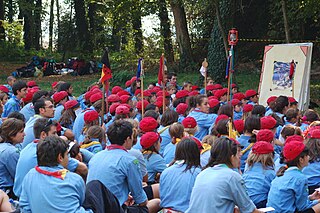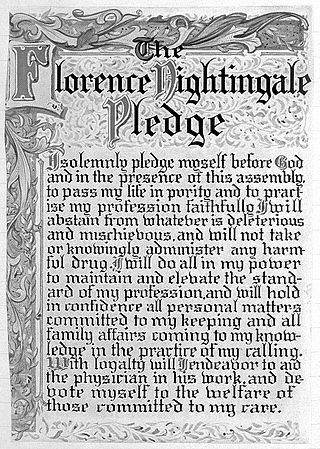Related Research Articles

An oath of office is an oath or affirmation a person takes before assuming the duties of an office, usually a position in government or within a religious body, although such oaths are sometimes required of officers of other organizations. Such oaths are often required by the laws of the state, religious body, or other organization before the person may actually exercise the powers of the office or organization. It may be administered at an inauguration, coronation, enthronement, or other ceremony connected with the taking up of office itself, or it may be administered privately. In some cases it may be administered privately and then repeated during a public ceremony.

The Pledge of Allegiance is a patriotic recited verse that promises allegiance to the flag of the United States and the republic of the United States of America. The first version was written in 1885 by Captain George Thatcher Balch, a Union Army officer in the Civil War who later authored a book on how to teach patriotism to children in public schools. In 1892, Francis Bellamy revised Balch's verse as part of a magazine promotion surrounding the World's Columbian Exposition, which celebrated the 400th anniversary of Christopher Columbus' arrival in the Americas. Bellamy, the circulation manager for The Youth's Companion magazine, helped persuade then-president Benjamin Harrison to institute Columbus Day as a national holiday and lobbied Congress for a national school celebration of the day. The magazine sent leaflets containing part of Bellamy's Pledge of Allegiance to schools across the country and on October 21, 1892, over 10,000 children recited the verse together.
"God Bless America" is an American patriotic song written by Irving Berlin during World War I in 1918 and revised by him in the run-up to World War II in 1938. The later version was notably recorded by Kate Smith, becoming her signature song.

The Amidah, also called the Shemoneh Esreh, is the central prayer of the Jewish liturgy. Observant Jews recite the Amidah at each of three daily prayer services in a typical weekday: morning (Shacharit), afternoon (Mincha), and evening (Ma'ariv). On Shabbat, Rosh Chodesh, and Jewish festivals, a fourth Amidah (Mussaf) is recited after the morning Torah reading, and once per year, a fifth Amidah (Ne'ilah) is recited, around sunset, on Yom Kippur. Due to the importance of the Amidah, in rabbinic literature, it is simply called "hatefila". According to legend, the prayer was composed by the rabbis of the Anshei Knesset HaGedolah. Accordingly, in Judaism, to recite the Amidah is a mitzvah de-rabbanan, i. e., a commandment of rabbinic origin.

Brownies are the section in the Girl Guides organisation for girls aged eight years old to twelve years old. Exact age limits are slightly different in each organisation.

"God Bless Our Homeland Ghana" is the national anthem of Ghana; it was adopted in 1957 when Ghana declared its independence from the United Kingdom.
"Forged from the Love of Liberty" is the national anthem of the Trinidad and Tobago. Originally composed as the national anthem for the short-lived West Indies Federation (1958–1962), this song was edited and adopted by Trinidad and Tobago when it became independent in 1962. It was written and composed by Patrick Castagne.
An oath of citizenship is an oath taken by immigrants that officially naturalizes immigrants into citizens. It is often the final step in this process, and is usually done in a ceremonial capacity. An oath of citizenship is designed to be a statement of patriotism and loyalty to the new country. In countries which retain a monarchical system of government, an oath of allegiance to the monarch is often required as well. Adding an oath to God to the end of an oath is usually optional.
The Day of Atonement, October 16, was established during the Million Man March in Washington, DC, on October 16, 1995 by the Nation of Islam.

Land of the Rising Sun was the proclaimed national anthem of the secessionist African state of Biafra, formerly known as Eastern Region, Nigeria. The lyrics were written by Nnamdi Azikiwe, and the tune was adopted from Jean Sibelius' "Finlandia", as Biafran president C. Odumegwu Ojukwu enjoyed the musical works of Sibelius.

The Blue Army of Our Lady of Fátima, now mostly known as the World Apostolate of Fátima, is a public international association that has as its general purpose "the promotion of the authentic teaching of the Catholic Church and the strict adherence to the tenets of the Gospel; the personal sanctification of adherents through faithful adherence to the Message of Our Lady of Fátima and the promotion of the common good by the spreading of that Message of Fátima".
A Hindu wedding, also known as Vivaha, Marathi: Lagna (लग्न), Bhojpuri: Biyah (बियाह), Bengali: Bibaho (বিবাহ), Kalyanam, Kannada script: ಮದುವೆ (Maduve), Tamil: திருமணம் (Tirumanam), or Pelli, is the traditional wedding ceremony for Hindus. The wedding ceremonies are very colourful, and celebrations may extend for several days and usually a large number of people attend the wedding functions. The bride's and groom's home—entrance, doors, wall, floor, roof—are sometimes decorated with colors, flowers, and other decorations.

"Death or Freedom" was the national anthem of the Chechen Republic of Ichkeria, a former partially recognized separatist state in the North Caucasus, used between 1991 and 2000. The music was composed in 1991 by either Ali Dimayev or Umar Beksultanov, and the lyrics were written by Abuzar Aydamirov.

The Nightingale Pledge, named in honour of Florence Nightingale, is a modified version of the Hippocratic Oath. Lystra Gretter and a Committee for the Farrand Training School Grace for Nurses in Detroit, Michigan created the pledge in 1893. Gretter, inspired by the work of Nightingale, the founder of modern nursing, credited the pledge to the work of her committee, but was herself considered "the moving spirit behind the idea" for the pledge.

Thanksgiving after Communion is a spiritual practice among Christians who believe in the Real Presence of Jesus Christ in the Communion bread, maintaining themselves in prayer for some time to thank God and especially listening in their hearts for guidance from their Divine guest. This practice was and is highly recommended by saints, theologians, and Doctors of the Church.

Coronations were held in Norway from 1164 to 1906, mostly in the Nidaros Cathedral in Trondheim. Although a crowning ceremony was formerly mandated by the nation's constitution, this requirement was eliminated in 1908. However, Norwegian kings have since chosen voluntarily to take part in a ritual of "benediction" to mark their accession to the throne, during which the crown is present, but not physically bestowed upon the sovereign. The new ceremony retains some of the religious elements of earlier rites, while eliminating other features now considered to be "undemocratic". There is no law preventing a coronation from occurring so any future monarch of Norway can choose to have one.

The Student Oath or Student Pledge is the oath that was recited in school at the beginning of every school day. It was used until 2013, among other things, in primary schools in Turkey. After the regular morning singing the national anthem İstiklâl Marşı before class, the oath was led by a boy or a girl, or some groups of 3–4 students and repeated by all other students.
"Yɛn Ara Asaase Ni" is the unofficial national anthem of Ghana. It was written and composed by Ephraim Amu in 1929 and is popularly sung in Twi. The original is however in the Ewe language.
"God Bless our Sunny Clime" is the national song of The Commonwealth of the Bahamas. Its music was composed by Timothy Gibson and E. Clement Bethel. The lyrics were written by the Rev. Philip Rahming, a Baptist minister and lecturer at the College of the Bahamas.

My Bougainville is the anthem of the Autonomous Region of Bougainville in Papua New Guinea. The anthem was officially adopted in 2018. It is sung to the tune of "The Song of Australia", the melody of which was composed by Carl Linger.
References
- ↑ The National Pledge of Ghana
- ↑ "The National Pledge". ghana.gov.gh. Retrieved 12 January 2014.